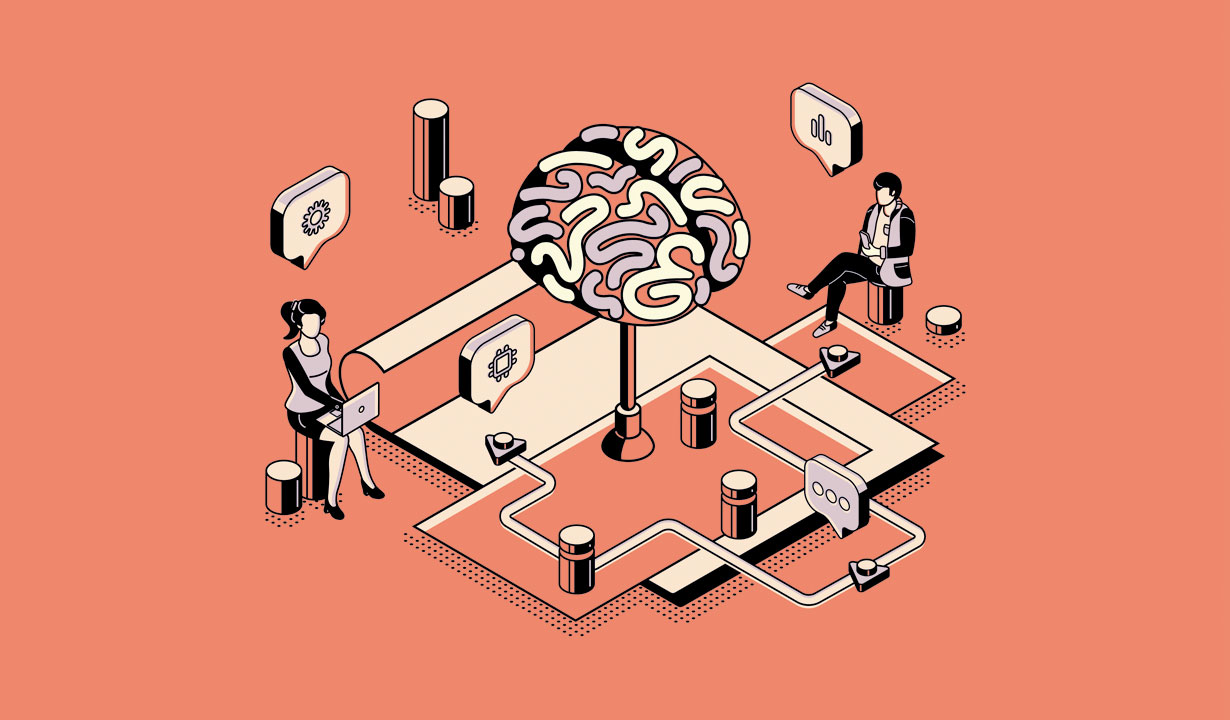The digitalization of large spheres of human life is progressing at a rapid pace. It entails not only technical and economic but also social change. IT infrastructures make our modern society work. Networked information and communication technologies make intelligent power grids, new medical applications and new forms of work possible. Behind this are algorithms and huge amounts of data, which bear great potential, but also social challenges, such as adequate regulation.
The scope and dynamics of digital transformation is reflected in many ITAS projects. On the one hand, researchers work on conceptual questions, such as trust and risk, governance of and by algorithms or the ethics of learning systems. On the other hand, they conduct analyses on the advancing automation and digitalisation of society using concrete digital technologies. Of particular importance is the question of how to deal responsibly with the developments of digitalization.
Digital work
Technical advances in robotics, sensor technology, and digital processes are fundamentally changing the world of work. The digital transformation affects all qualification levels. At the same time, new business areas are emerging, for digital corporations, but also for start-ups. Besides the change in industrial production, ITAS is increasingly investigating changes in the service sector. For example, the EU project Crowdwork 21 focuses on the phenomenon of platform work, where work tasks are distributed over the network. In this context, visions for a successful design of the digital transformation of the world of work are also taken into account.
Governance and algorithms
Be it in questions of the allocation of loans, jobs, or study places, the assessment of legal penalties, or even the identification of terrorists. More and more often, computer systems “have a say” in decisions that significantly influence the possibilities of free personal development. ITAS investigates the risks of discrimination by algorithms and, in the GOAL project, deals with structures and design options for the governance of algorithms, especially with regard to risks to fundamental rights and other social values.
Artificial intelligence
Another research focus at ITAS is on learning systems. Here, researchers are investigating the fundamental question of social trust in in technologies that use artificial intelligence. For example, ITAS took a look at political options for ealing with deepfakes - photo, audio, and video recordings manipulated by AI but appearing realistic - for the European Parliament. In addition, the researchers are also investigating societal perspectives on digitization and the use of AI in agriculture and the bioeconomy, for example in the DESIRA project. Prevailing discourses and societal needs are also the subject of research, such as design options or inclusion of disadvantaged groups.
(In-)Security, risk, and politics
Security is of great importance for modern societies. Nevertheless, or precisely because of this, they must constantly deal with insecurity. Politicians in particular often have to rely on uncertain knowledge when making decisions. The MOTRA project examines how the quest for security and the emergence of new insecurity are intertwined in the field of extremism prevention.
Projects on the topic
- DESIRA
- EU project Crowdwork
- Governance of and by algorithms (GOAL)
- MOTRA-TM
- PhD College Accessibility through AI-based Assistive Technology (KATE)
- Real-world Lab “Robotic Artificial Intelligence”
- Risks of discrimination by algorithms
- Social trust in learning systems
- Tackling Deepfakes in the new AI Legislative Framework
- Visions and best practices for the digital transformation
To the complete project list
Experts
- Artificial intelligence:
Reinhard Heil - Digital work:
Dr. Linda Nierling - Digitalization in agriculture:
Dr. Christine Rösch - Governance of/by algorithms:
Dr. Carsten Orwat - (In)security, risk and politics:
Dr. Christian Büscher
Further contact
Jonas Moosmüller
Public relations
Tel.: +49 721 608-26796
E-mail
Publications on the topic
Demokratische Technikgestaltung in der Arbeitswelt
2024. WSI-Mitteilungen, 77 (1), 50–57. doi:10.5771/0342-300X-2024-1-50
Künstliche Intelligenz außer Kontrolle?
2024. TATuP - Zeitschrift für Technikfolgenabschätzung in Theorie und Praxis, 33 (1), 64–67. doi:10.14512/tatup.33.1.64
KI-Textgeneratoren als soziotechnisches Phänomen – Ansätze zur Folgenabschätzung und Regulierung
2024. KI:Text – Diskurse über KI-Textgeneratoren. Ed.: G. Schreiber, 341–354, De Gruyter. doi:10.1515/9783111351490-021
Drawings for Insight on Preschoolers’ Perception of Robots
2024. Companion of the 2024 ACM/IEEE International Conference on Human-Robot Interaction, 920–924, Association for Computing Machinery (ACM). doi:10.1145/3610978.3640608
Technology hype : Dealing with bold expectations and overpromising = Technologie-Hype: Der Umgang mit überzogenen Erwartungen und Versprechungen
2023. Oekom Verlag
Technology hypes: Practices, approaches and assessments
2023. TATuP - Zeitschrift für Technikfolgenabschätzung in Theorie und Praxis, 32 (3), 11–16. doi:10.14512/tatup.32.3.11
Die soziomaterielle Konstitution von Cybersicherheit in der Dynamik kritischer Informationsinfrastrukturen
2023. Polarisierte Welten : Verhandlungen des 41. Kongresses der Deutschen Gesellschaft für Soziologie 2022. Hrsg.: P.-I. Villa
Technology-Centric Real-World Labs: Challenges and Opportunities for a New Mode of Participatory Research From the Perspective of Computer Science
2023. 10. Workshop Mensch-Maschine-Interaktion in sicherheitskritischen Systemen, Gesellschaft für Informatik (GI). doi:10.18420/muc2023-mci-ws02-431
Einige ethische Implikationen großer Sprachmodelle
2023. Karlsruher Institut für Technologie (KIT). doi:10.5445/IR/1000158914
MOTRA-Monitor 2022
2023. Monitoringsystem und Transferplattform Radikalisierung (MOTRA). doi:10.53168/ISBN.978-3-9818469-6-6_2023_MOTRA
Ein sicherer Raum für alle – Plädoyer für ein demokratisches und partizipatives Metaverse
2023
Aktuelle Befunde aus dem Technologiemonitoring – Extremismus und Radikalisierung imMetaverse. MOTRA-Spotlight 08/23
2023. Monitoringsystem und Transferplattform Radikalisierung (MOTRA)
Technologiemonitoring: Das Potenzial von Metaverse und KI für extremistische Verwendungszwecke
2023. MOTRA-Monitor 2022. Hrsg.: U. Kemmesies, 226–252, Monitoringsystem und Transferplattform Radikalisierung (MOTRA)
Digitalisierung, Theologie und Technikfolgenabschätzung: Interview mit Gernot Meier
2023. TATuP - Zeitschrift für Technikfolgenabschätzung in Theorie und Praxis, 32 (2), 58–61. doi:10.14512/tatup.32.2.58


